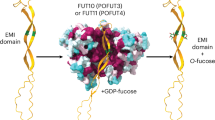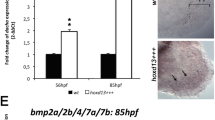Abstract
Two new, putative alpha-1-3/4 fucosyltransferases ([alpha]1-3/4 Fuc-Ts), Fuc-TX and Fuc-TXI, were identified in the vertebrate genome and transcriptome sequence databases through sequence homology-based queries. These proteins have a significant sequence similarity to only [alpha]1-3/4 Fuc-Ts, and possess peptide motifs that are evolutionarily conserved among the known vertebrate [alpha]1-3/4 Fuc-Ts. However, Fuc-TX and Fuc-TXI lack the HH[R/W][D/E] sequence that determines the specificity for type 1 or 2 substrates among the known vertebrate enzymes, and Fuc-TXI proteins do not possess a transmembrane domain. The Fut10 and Fut11 genes that encode these proteins are expressed ubiquitously in the adult mouse and in the mouse embryo throughout development. Though a Fuc-T activity of the mouse proteins could not be detected, Fuc-TXI, but not Fuc-TX, was found to hydrolyze GDP-fucose. The interaction of Fuc-TXI with GDP-fucose was also confirmed by its binding to GDP-hexanolamine. In zebrafish, Fut11 transcripts could be detected during early embryonic development. A knock-down of Fuc-TXI in zebrafish embryos with Fut11-specific antisense morpholino oligonucleotides resulted in malformations of the posterior trunk and tail.
Similar content being viewed by others
Article PDF
Author information
Authors and Affiliations
Rights and permissions
About this article
Cite this article
Patnaik, S. Characterization of Fut10 and Fut11, Putative Alpha-1-3/4 Fucosyltransferase Genes Important for Vertebrate Development. Nat Prec (2007). https://doi.org/10.1038/npre.2007.141.1
Received:
Accepted:
Published:
DOI: https://doi.org/10.1038/npre.2007.141.1



